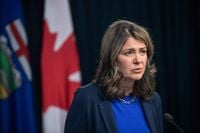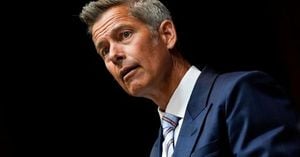As the 2025 school year gets underway, parents across the United States are confronting a wave of confusion and hesitation over childhood vaccines—an uncertainty that experts say is fueling the country’s worst measles outbreak in three decades, a resurgence of whooping cough, and a spike in pediatric flu deaths not seen in more than ten years. Behind this troubling trend lies a confluence of shifting federal policies, growing skepticism amplified by political narratives, and the abrupt halting of major vaccine research investments.
The roots of this crisis trace back to recent actions by Health and Human Services Secretary Robert F. Kennedy Jr., whose controversial decisions and public statements have both reflected and emboldened a segment of the American public wary of vaccines. According to Axios, Kennedy’s move to stop recommending COVID-19 vaccines for healthy children has opened the door for broader doubts about the effectiveness and safety of long-established shots for measles, mumps, rubella (MMR), pertussis, and chickenpox. “They feel like if the government has chosen RFK Jr. to be the head of Health and Human Services, there must be something to that. There must be a reason to question vaccines,” explained Paul Offit, director of the Vaccine Education Center at the Children’s Hospital of Philadelphia.
These doubts are not just theoretical—they’re showing up in pediatricians’ offices and school records nationwide. Some clinics and children’s health systems are now grappling with whether to keep unvaccinated patients on their rosters, citing concerns about the risk posed to other children in crowded waiting rooms. “It’s gotten so bad that you’re concerned about the waiting room with a lot of children who are unvaccinated. That’s a risk, not only to them, but the children they come in contact with,” Offit told Axios.
Nationally, the data paint a worrisome picture. Kindergarten vaccine exemptions increased in 36 states and the District of Columbia during the 2024-2025 school year, Axios reports. Full vaccination rates for children entering kindergarten have dropped to just over 92%, as Elisabeth Rosenthal noted in the New York Times. In more than a dozen states, that rate has fallen below 90%, and in Idaho, it’s dipped under 80%. The result? More than 1,300 measles cases in a country that had declared the disease eliminated a quarter-century ago, over 150 hospitalizations, and three deaths—each unvaccinated.
“Measles doesn’t care so much about what’s going on nationwide, it cares what’s going on in the community that it’s entered,” said Richard Besser, CEO of the Robert Wood Johnson Foundation. Localized drops in vaccination—like those seen in West Texas, where some classrooms reported upwards of 50% of children unvaccinated—can quickly turn into outbreaks, regardless of overall national numbers.
Vaccine hesitancy in the United States is not new, but it has been supercharged by a combination of government policy shifts, misinformation, and changing social attitudes. The removal of thimerosal, a mercury-containing preservative in flu shots, was cited by anti-vaccine activists as a tacit admission of harm, despite the lack of scientific evidence linking it to autism. Meanwhile, Kennedy has qualified his support for the measles vaccine during outbreaks, stating, “the decision to vaccinate is a personal one,” and suggesting the use of ineffective treatments, according to Axios. Professional organizations like the American College of Obstetricians and Gynecologists and the American Academy of Pediatrics have publicly disagreed with Kennedy’s positions.
Rosenthal, writing in the New York Times, points out that Kennedy, who lacks medical or scientific training, has funded new research into the already disproven link between MMR vaccines and autism. “Vaccines have been miraculous in preventing terrible diseases from polio to tetanus to measles. Numerous studies have shown they do not cause autism. That is accepted by the scientific community,” Rosenthal emphasized. Yet, public skepticism has grown, fueled by poor government communication, the proliferation of online misinformation, and the ballooning number of recommended vaccines—rising from 11 doses in 1986 to as many as 54 by age 18 today.
Complicating matters further, the Department of Health and Human Services announced on August 18, 2025, that it would wind down 22 mRNA vaccine development projects under the Biomedical Advanced Research and Development Authority (BARDA), halting nearly $500 million in investments. Rick Bright, former BARDA director, wrote in the New York Times that this decision “undercuts one of the most significant medical advances in decades.” The mRNA platform, which enabled the rapid development of COVID-19 vaccines, is now being tested for personalized cancer vaccines, autoimmune therapies, and treatments for rare diseases. “The answer to limitations is improvement, not abandonment,” Bright asserted, warning that abandoning mRNA technology would forfeit a strategic public health and national security advantage.
The consequences of these policy shifts extend beyond childhood vaccines. Confusion now clouds adult vaccination as well, particularly regarding COVID-19 boosters and the relatively new maternal RSV vaccine. David Hackney, a fetal medicine physician in Cleveland, told Axios, “It’s a little bit tricky since the COVID [shot] was taken off of the immunization schedule for the CDC. You always just have a lot of baseline vaccination hesitancy and we’ve always relied on alignment with our federal institutions.”
Political narratives have only deepened the divide. During the Trump administration, skepticism about COVID-19 vaccines was stoked by conservative media and reframed as a question of personal liberty. “Suddenly, the anti-vax crowd was not a small fringe of liberal parents, but a much larger group of conservative stalwarts who believed that being forced to vaccinate their kids to enter school violated their individual rights,” Rosenthal observed. Even as Operation Warp Speed accelerated the development of COVID-19 vaccines, doubts about the new mRNA technology and the necessity of the shots persisted.
Most parents, thankfully, still vaccinate their children on time. “Most parents believe in vaccination and get their kids fully vaccinated on time,” Besser told Axios. But the overall high rates can mask alarming regional drop-offs, where the risk of outbreaks is greatest. Meanwhile, flu vaccination rates among adults remain low—between 36% and 54% in the 2024-25 season—often due to skepticism about effectiveness. “I got the flu vaccine, and I still got the flu” is a common refrain, as noted by vaccine acceptance researcher Rupali Limaye at Johns Hopkins University.
Experts warn that the erosion of trust in vaccines could have deadly consequences—not just for children, but for society at large. As Rosenthal wrote, “Alternative facts have formed what David Scales, a physician and sociologist at Weill Cornell Medical College who studies misinformation, calls ‘an unhealthy information system.’ It is an alternative scientific universe in which too many Americans live. And some die.”
With biological threats evolving and new viruses emerging, the United States now stands at a crossroads. The decision to recalibrate—or abandon—critical vaccine programs will shape not only the health of its own citizens, but its ability to respond to the next global emergency. The stakes, as this school year’s outbreaks have made painfully clear, could not be higher.





